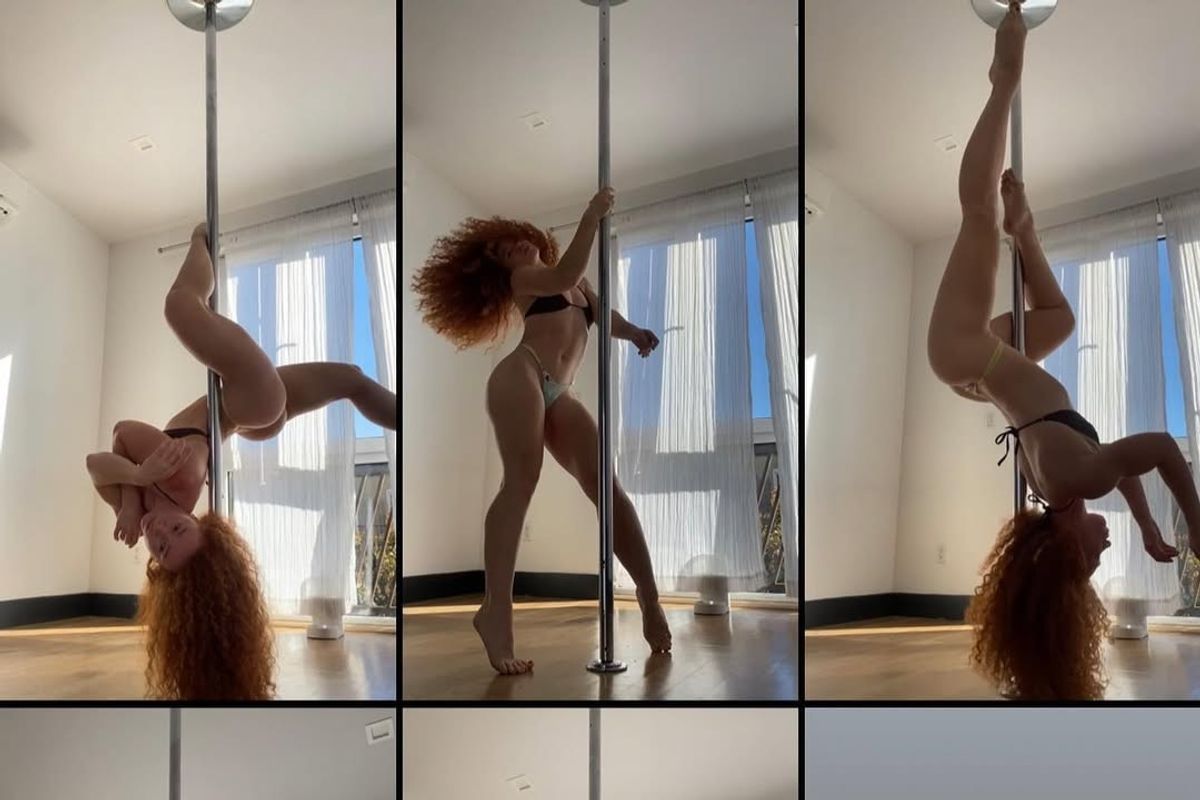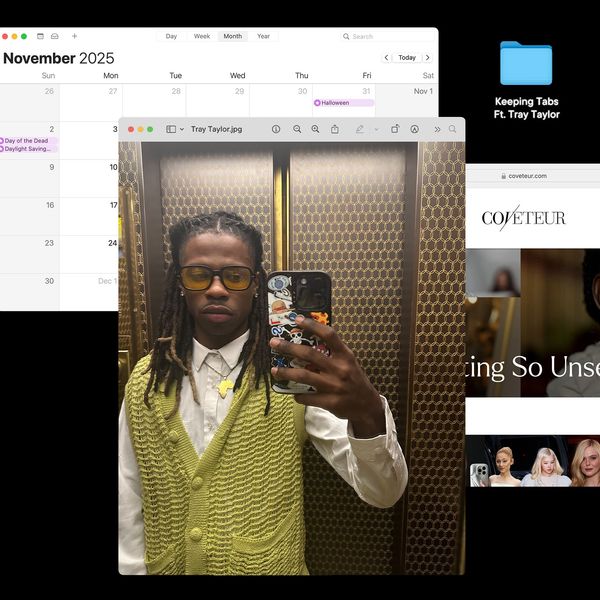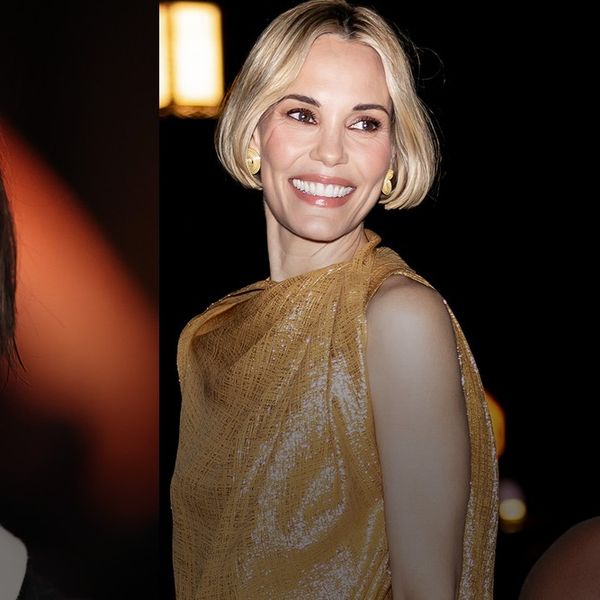For Sammy Picone, Pole Dancing Is Personal & Political
"It's a tool, it's a conduit, and it's a medium."

For Sammy Picone, honoring the history of pole dancing and crediting strippers and sex workers for the art form is top of mind—this is what she preaches in her classes both when her co-founded dance school SADA was teaching in person and now online through Patreon. Her next goal is to encourage students to stop moving like human beings, to completely shut out the outside world and shut down their inner worlds, and put everything into the trust they have for themselves and their bodies. This is, of course, all easier said that done and, nearly eleven years into her practice, Picone is still learning.
I connected with Picone virtually and immediately noted her timid demeanor, which she quickly acknowledged on her own. "Honestly, being in front of any camera or in front of any room is deeply uncomfortable for me," she shared. "Even teaching, honestly. I get nervous before every single class." But when she gets on a pole, everything goes quiet. Nerves fade, and she dances with a pride that can only come from your body doing things that you didn't think were possible.
Ahead, we chat about performing for Erykah Badu and with Summer Walker, judgmental misconceptions regarding what she does for a living, seeking out community amongst strippers and sex workers, and the conversations that still need to be had.
Tell me a little about your background and how you got into pole...
"I sort of had an unexpected, I guess, intro into pole. I was about three weeks out from graduating college and a friend got a Groupon and was like, 'come with me'. And I had been having a rough go at college. I had a cancer diagnosis, a couple of other health diagnoses, and so I was not into the idea of dancing in a room where I was going to be looking at myself in front of a mirror, et cetera, et cetera. But I went. Obviously it was hard, it's really vulnerable, but eventually, within a couple of classes, I was able to do my first trick and I videotaped it. And that high that you get when you see your body do something that you didn't think it could do got me. That was sort of my hook in. I just continued from there. I got a pole in my living room because I was like, well, I definitely can't afford to take classes all the time, so I'm just going to teach myself. So I got a pole and I just taught myself, and that's what I've been doing for almost 11 years."
What's the biggest misconception about pole? What do people assume when you describe what you do?
"Pole originated in strip clubs, obviously, and so people tend to assume that I work in a strip club. Although that's not the case for me, I think even more important than the misconception is really the attitudes behind what people think when they assume that I work in a strip club. And so while I don't, it is a really hard and a respectable job. And I think, as a pole dancer, it's very, very important and it's really a responsibility to find a good way to respond to people when they present you with these misconceptions and the attitudes behind them."
instagram.com/sammypicone
For someone who wants to get into pole, where would you recommend they start?
"There's no particular move that I would start with, but I would definitely nudge people towards, even if you want to be self-taught, at least take an intro to pole, or at least a few intro to pole classes. Even better, if you can find it in your community, learn it from strippers. It's, again, about going back to honoring its origins. One of the best ways that you can do that is by learning from strippers. And if not, then just find an intro to pole class. It's definitely helpful to be taught by an in-person instructor, at least for those first few fundamental steps."
How would you describe the creative process behind pole?
"So the creative process actually is something that I'm deeply fascinated by because pole is mostly a tool, it's a conduit, and it's a medium. And so just like any other medium, you're learning essentially a language and really with the intent to story tell. So I think that there's some really important steps in order to be able to do that in a way that is nuanced and authentic. I think some of us tend to skip these steps because we are so focused on consuming other people's art versus looking inward. There are a few steps. I think one involves consuming and being inspired. You can't practice pole without looking at all the places that it's come from and looking at all the artists that inspire you. And I think the next step would be hardwiring. You have to really hardwire these moves into your body through repetition, through, I guess establishing emotional connection via music. There's a whole bunch of things that go into hardwiring so that it's committed to muscle memory. And then I think the crucial step is turning inward and putting blinders on and just, at least for a moment, stop consuming and start spending time with yourself. It's like a big, big step of self-discovery. And that's the point at which I think you take this language that you've gathered and collected from the people who came before you, and you make it into, or at least you make your stories into something that are nuanced and authentic, and you develop an authentic way of channeling what's yours."
instagram.com/sammypicone
What have you learned about yourself through pole, whether that be doing it yourself or teaching it?
"I think that I have learned self-trust to some degree, not in every part of life, but I've definitely learned a lot of self-trust through that process that I just referred to. That process, I think after being 10 years in and being able to step back and see the process, I'm able to really apply that to almost every other aspect of life and any other thing that I could learn or want to learn in the future. And with that, there's this really incredible level of self-trust I think that comes with that. And teaching it, too. I think being able to watch myself convey this concept and this potential to students is also really special. Then I get to see them discover it in themselves."
Does dancing on a pole feel therapeutic?
"Absolutely. For many reasons. I think one of them, again, is developing that self-trust, an agency that you also learn within yourself in doing something. Specifically doing something that's really, really hard and very physical. It's very somatic. And so there is a presence that's required and there's no if, ands or buts about it, you are going to be present with your body, and it's really hard to focus on anything else aside from what you're doing. And so in that way, it's a really efficient way at pressing pause on everything just for a moment. You know what I mean? And so in that way, it's very therapeutic."
Were you creative growing up? Did you dance as a child?
"No. Well, when I was five or six, I took some afterschool dance stuff, but this was the first time that I had a consistent dance practice."
What can people expect from a class with you?
"They can expect a lot of foundations. I'm really, really big in teaching the foundations, mostly because my goal as a teacher is to be able to offer my students the words and then the space to be able to do that next step that I had talked about earlier, which is like: okay, now you have the words, you've hardwired it. We've practiced this hundreds of times. Now I want you to turn inward and sit with what's coming up for you and how you're feeling, and let's channel that through what we have hardwired together. So in a nutshell, basics. Sometimes we'll work on more complicated stuff just because it's fun, but I want people to be more focused on learning to move like themselves versus trying to emulate looking like the teacher or like me, if that makes sense."
instagram.com/sammypicone
Were you always someone comfortable being the center of attention or being in front of a group?
"Not at all. I'm still not at all and I've been doing it for eight years now. Speaking was a thing that just took me a long time to get used to and a lot of practice. So in elementary school, the teachers actually thought I was mute, so there was a long process."
Do you feel nervous while dancing? Or is that where you feel comfortable?
"It depends on if it's for myself or performance. For a performance, yeah. I mean, I completely black out when I'm doing it for myself. I don't feel nervous at all. It truly is that pause button that I was referencing earlier when I'm teaching, I guess it's more so that sweet spot. I go in feeling nervous, but then as soon as I start teaching, there's a muscle memory there that allows me to feel really, really grounded in all that I've practiced and believed in over the last 10 years. So that's really cool. That's one area where I feel like there's a lot of growth."
instagram.com/sammypicone
In terms of your personal practice, how much is routine and how much is freestyle?
"It's 90% freestyle and the other 10% is not routine, but it is more of that hardwiring process. So I usually approach a training session with a little blip of inspiration, and I say blip because I just try to encourage my students to avoid trying to move a person. And so I'll take a very small element, like an extraction I call it, from what I'm seeing that they're doing that's inspiring me. It could be as small as just a pirouette or just a cool shape they've made with their arm. And I spend about 10% of my training practicing that just to be like: okay, I have the mechanics down and then I spend the last 90% free-styling and trying to incorporate and infuse it in different ways."
How long did it take for you to feel comfortable free-styling? How much of a basis for the technique did you need before you felt comfortable just going for it?
"It's a long process, but I encourage students and myself to freestyle even before you are comfortable. Freestyle through the discomfort. Because to be honest, I don't think I got comfortable free-styling until maybe five years in. And even then, I look back at the videos and I'm like: what were you doing? I was really proud at the time."
Can you talk about your experience performing for an audience?
"I haven't performed in a long time now. I performed a lot more during my first maybe eight years of polling. Some were smaller shows that I would do mostly local in New York, some were traveling to teach pole, and there were the larger gigs that I did. I've performed for Erykah Badu's birthday, I believe that was in 2020. And I also was able to go on tour with Summer Walker. That was a 25 show run, which was terrifying and also awesome all at the same time. So I've had some really, really lucky experiences, and I definitely am thankful that I did them because, when I remember being approached for them, there was a big part of me that was like: absolutely not. This is too much. I'm glad I pushed myself out of my comfort zone with those."
How do you feel after a performance?
"I feel incredible. One of the biggest reasons why I'm thankful for the tour is that a concert is long. And so instead of performing for just a three, four minute period, you're performing for almost an hour. Not an hour straight, but an hour. So it gave me moments to occasionally come up from that blackout that I referred to and actually be present and realize where I was and take in the audience and the live music and the fact that I was on stage with Summer Walker and take in all these once in a lifetime things. So that was very, very cool. And then, afterwards it's always just a really prideful feeling."
instagram.com/sammypicone
Does consuming or creating other forms of art help you stay creative in terms of pole?
"Definitely. I think that's important. It becomes more of just a journaling exercise and that's where newness and less sameness comes from. So whatever I'm producing creatively is really from the bank of words that I've collected over my first number of years and nothing more. I think that's going to be different for everybody. I think that consuming in bits here and there over the years is going to continue to be important for people. And then I think others may be more like me where sometimes you have to stop consuming altogether."
instagram.com/sammypicone
Do you think there has been a cultural shift in how people think about pole dancing? Or is there still a lot of work to be done and conversations to be had?
"I think both. I think there's a lot of shift. Online we're stuck in our echo chambers and there's so many people that still need to be reached. And I think even within our echo chambers, there's a lot of conversation to be had. Unfortunately, a lot of it happens on the internet. There's a lot of dehumanizing on the internet and just a lot of binary thinking, and I think that gets in our way. I think that there, at least in the pole community, I can see a shift towards an increase in, like I was talking about before, the honoring of the origins of pole dancing. I see people learning from strippers more and paying strippers and educating themselves, et cetera. I think that has improved from at least the student base that I have access to. But yeah, there's definitely a lot more conversation needed."
For people that want to pursue it as a hobby, how would you suggest that they go about honoring the history?
"I think that there are quite a few ways and some work better for others and so on and so forth. I think that first things first, it's important to, if not to learn from strippers and sex workers, at least to do your own research, just so you know the background, the origins, and the history of what you're practicing when you're sharing your work. I think it's important to also talk about that, whether you're sharing it via performance or you're sharing it because you're teaching people. I think that it's very valuable to, if you can't pay strippers to teach you or if you can't find strippers to learn from, donate your money to organizations. There's one that I give some of the proceeds from my Patreon to called Decrim New York which is an effort towards decriminalizing. Always, always speaking about, or I guess citing where you're getting your inspiration from is important. Go to strip clubs. Be in community with strippers."




